C Exercises: Insert a new node at the end of a Singly Linked List
5. Append Node Variants
Write a program in C to insert a new node at the end of a Singly Linked List.
Visual Presentation:
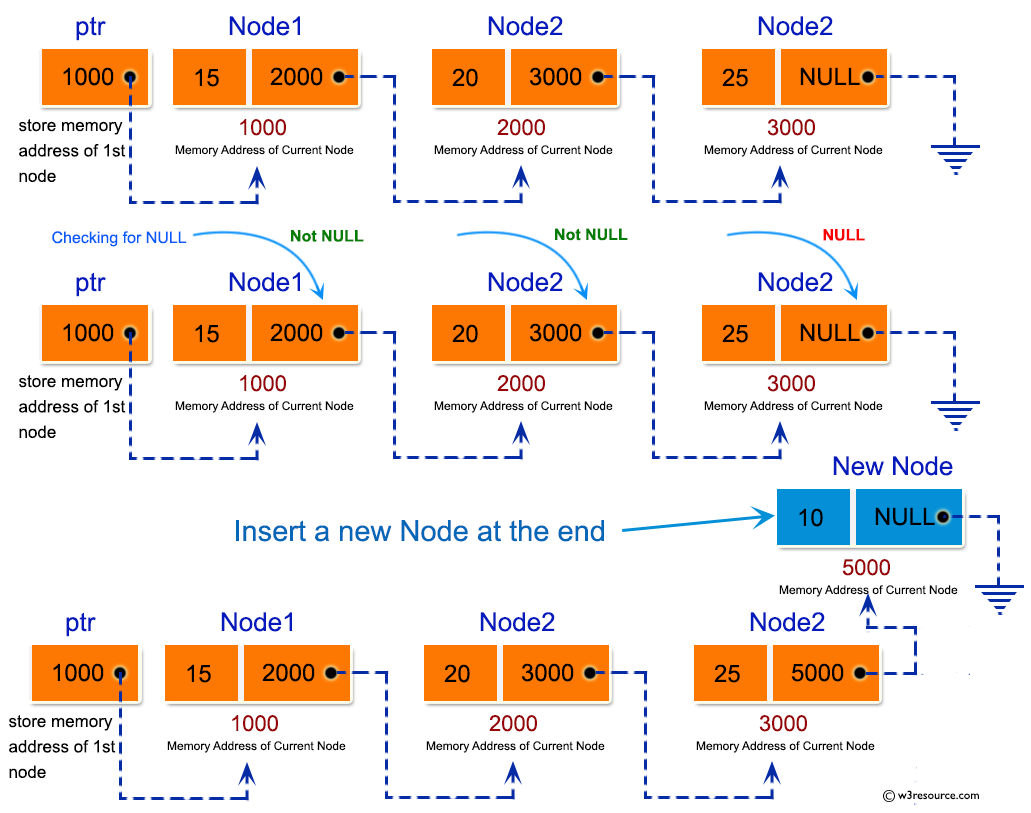
Sample Solution:
C Code:
#include <stdio.h>
#include <stdlib.h>
// Structure for a node in a linked list
struct node
{
int num; // Data of the node
struct node *nextptr; // Address of the node
}*stnode; // Pointer to the starting node
// Function prototypes
void createNodeList(int n); // Function to create the linked list
void NodeInsertatEnd(int num); // Function to insert a node at the end of the list
void displayList(); // Function to display the list
// Main function
int main()
{
int n, num;
// Displaying the purpose of the program
printf("\n\n Linked List : Insert a new node at the end of a Singly Linked List :\n");
printf("-------------------------------------------------------------------------\n");
// Inputting the number of nodes for the linked list
printf(" Input the number of nodes : ");
scanf("%d", &n);
// Creating the linked list with n nodes
createNodeList(n);
printf("\n Data entered in the list are : \n");
displayList();
// Inputting data to insert at the end of the list
printf("\n Input data to insert at the end of the list : ");
scanf("%d", &num);
NodeInsertatEnd(num);
printf("\n Data after inserted in the list are : \n");
displayList();
return 0;
}
// Function to create a linked list with n nodes
void createNodeList(int n)
{
struct node *fnNode, *tmp;
int num, i;
stnode = (struct node *)malloc(sizeof(struct node));
if(stnode == NULL) // Check whether the stnode is NULL and if so, no memory allocation
{
printf(" Memory can not be allocated.");
}
else
{
// Reads data for the node through keyboard
printf(" Input data for node 1 : ");
scanf("%d", &num);
stnode-> num = num;
stnode-> nextptr = NULL; // Links the address field to NULL
tmp = stnode;
// Creates n nodes and adds them to the linked list
for(i = 2; i <= n; i++)
{
fnNode = (struct node *)malloc(sizeof(struct node));
if(fnNode == NULL) // Check whether the fnNode is NULL and if so, no memory allocation
{
printf(" Memory can not be allocated.");
break;
}
else
{
printf(" Input data for node %d : ", i);
scanf(" %d", &num);
fnNode->num = num; // Links the num field of fnNode with num
fnNode->nextptr = NULL; // Links the address field of fnNode with NULL
tmp->nextptr = fnNode; // Links previous node i.e. tmp to the fnNode
tmp = tmp->nextptr;
}
}
}
}
// Function to insert a node at the end of the list
void NodeInsertatEnd(int num)
{
struct node *fnNode, *tmp;
fnNode = (struct node*)malloc(sizeof(struct node));
if(fnNode == NULL)
{
printf(" Memory can not be allocated.");
}
else
{
fnNode->num = num; // Links the data part
fnNode->nextptr = NULL;
tmp = stnode;
while(tmp->nextptr != NULL)
tmp = tmp->nextptr;
tmp->nextptr = fnNode; // Links the address part
}
}
// Function to display the linked list
void displayList()
{
struct node *tmp;
if(stnode == NULL)
{
printf(" No data found in the empty list.");
}
else
{
tmp = stnode;
while(tmp != NULL)
{
printf(" Data = %d\n", tmp->num); // Prints the data of the current node
tmp = tmp->nextptr; // Advances the position of the current node
}
}
}
Sample Output:
Linked List : Insert a new node at the end of a Singly Linked List :
-------------------------------------------------------------------------
Input the number of nodes : 3
Input data for node 1 : 5
Input data for node 2 : 6
Input data for node 3 : 7
Data entered in the list are :
Data = 5
Data = 6
Data = 7
Input data to insert at the end of the list : 8
Data, after inserted in the list are :
Data = 5
Data = 6
Data = 7
Data = 8
Flowchart:
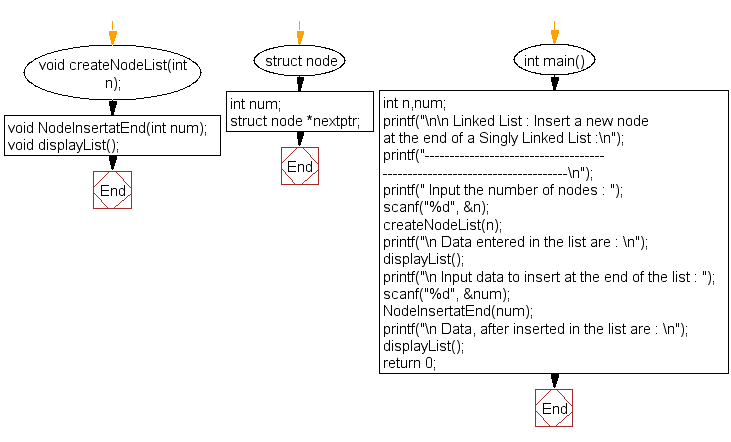
createNodeList() :
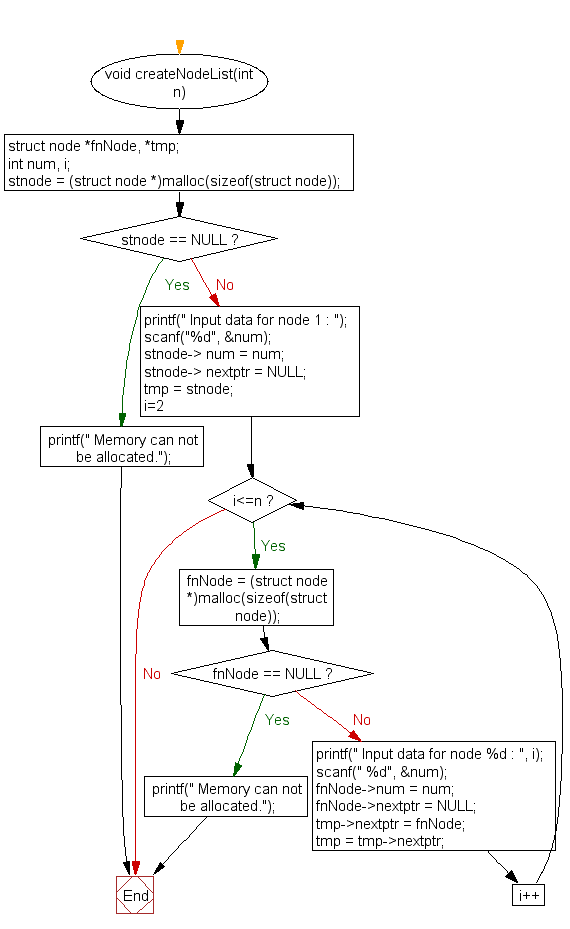
NodeInsertatEnd() :
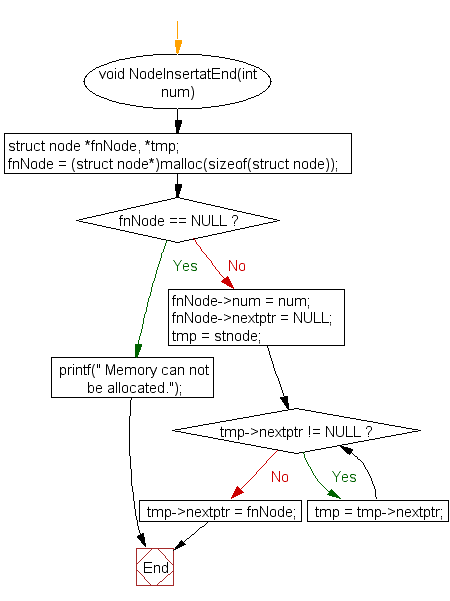
displayList() :
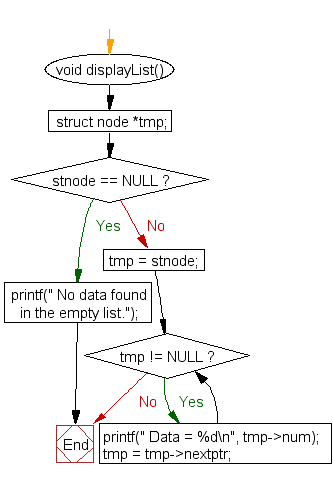
For more Practice: Solve these Related Problems:
- Write a C program to insert a new node at the end of a singly linked list using a tail pointer for faster insertion.
- Write a C program to continuously append nodes until the user inputs a specific sentinel value, then display the list.
- Write a C program to append a new node only if its value is not already present in the linked list.
- Write a C program to add multiple nodes at the end of a linked list and display the updated list after each insertion.
Go to:
PREV : Prepend Node Challenges.
NEXT : Middle Insertion Variants.
C Programming Code Editor:
Have another way to solve this solution? Contribute your code (and comments) through Disqus.
What is the difficulty level of this exercise?
Test your Programming skills with w3resource's quiz.
